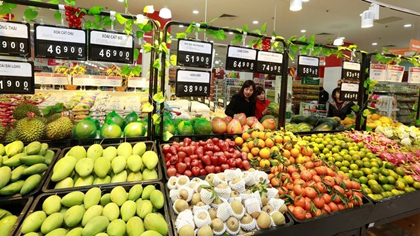Opportunities for Vietnam's agricultural products to enter EU market
European Union (EU) Commissioner for Agriculture and Rural Development Phil Hogan has recently led a delegation of 42 EU businesses to Hanoi to attend a conference on the theme of the EU–Vietnam Free Trade Agreement (EVFTA) and food safety and market access for agricultural products.
 |
| With the recently concluded EU–Vietnam Free Trade Agreement, Vietnamese agricultural products will be granted entry to the EU market. |
At the event, the head of the EU agricultural sector said that the recently concluded EVFTA would bring great opportunity to both Vietnamese and European manufacturers in search of growing market for high-quality agricultural products of both sides.
In fact, in recent years, Vietnam’s exports in general and exports of agricultural products in particular to the EU market have been quite stable. In 2015, the bilateral trade turnover reached more than EUR38.4 billion, of which Vietnam’s exports to the EU were worth EUR29.9 billion and imports EUR8.4 billion.
Vietnam currently ranks 21st on the list of the EU’s trading partners, and the EU is Vietnam’s second-largest trading partner, after China. So, if EVFTA is signed, it will create new opportunities for Vietnam’s agricultural sector as 90% of its strategic commodities, such as coffee, seafood, wood and wood products entering the market will enjoy a zero tax rate.
However, it is plain to see that Vietnamese agricultural exports to the EU face many barriers, as many exports of foodstuffs have failed to gain a foothold in the EU market, though in recent years this area has always recorded high growth.
Particularly, in 2015, agricultural products and foodstuffs exported to the EU totalled EUR2.5 billion, only a tenth of the total of agricultural product exports.
Another difficulty is non-tariff barriers such as origin and, especially, quality and food safety, as the EU market sets very high standards on such issues. Meanwhile, Vietnam’s agricultural products, like tea, vegetables, fruits and fish, still face limitations because of residue from pesticides, and wood products must be of transparent origin.
Moreover, in joining EVFTA, Vietnam has to commit to open its market to some agricultural imports. So, with advantages in terms of the quality and diversity of products, pressure from the EU’s agricultural products will force the domestic agricultural sector to restructure and improve their quality in order to compete in an equal manner, if it does not want to rule itself out of the domestic market.
To affirm the position and increase the growth rate of Vietnam’s agricultural sector on the international market in general and in the EU in particular, the agricultural sector has accelerated the restructuring of production, with changes in cultivation, production and processing to yield products of high quality, meeting the demand of fastidious markets such as the EU.
In addition, the sector should cooperate with relevant authorities, including the Ministry of Foreign Affairs and the Ministry of Industry and Trade, to access timely information on markets and trade promotion policies from import partners, to help Vietnam’s agricultural products reach the EU market in a more efficient way.
(Source: NDO)
.
 về đầu trang
về đầu trang






